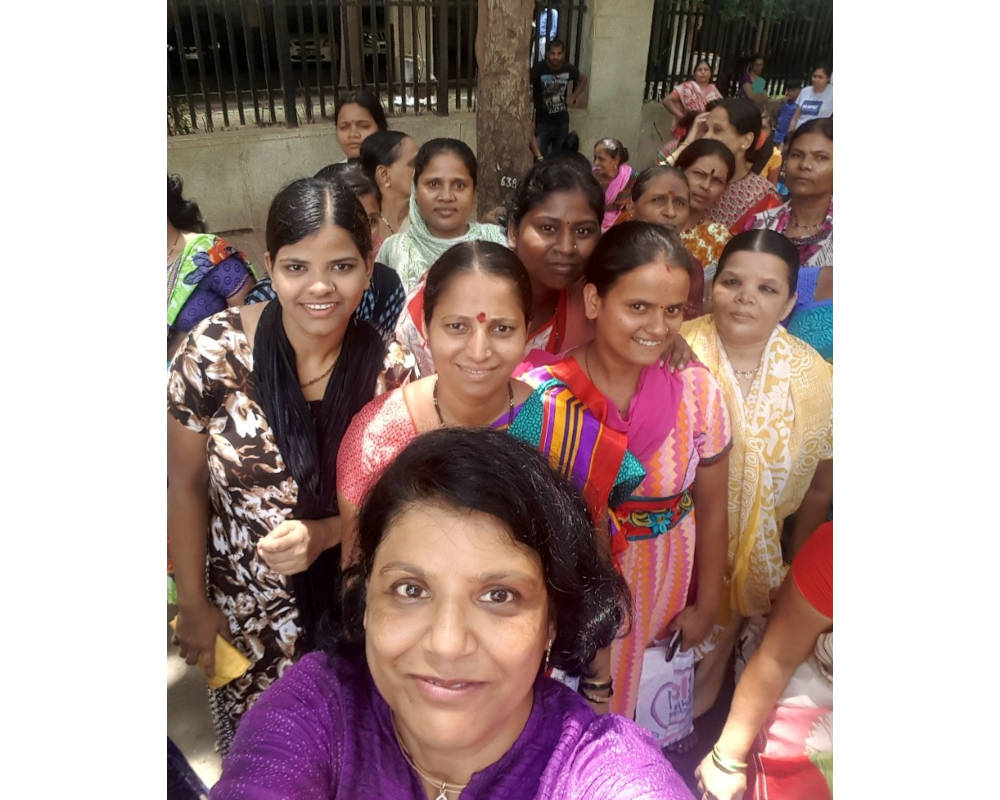Ground Realities is a new blog, anchored by the team at Quipper Research, led by its co-founder and CEO, Piyul Mukherjee.
It is an attempt to understand what’s happening inside people’s homes, in their lives. The ups and downs, as reflected in their social and economic world.
Bringing employers and employees together
By Piyul Mukherjee and Ipsita Bandyopadhyay

[Meenakshi Jain with LinkedIn co-founder, Allen Blue]
Meenakshi G. Jain
Profile: Founder & CEO, Helper4U, founded in 2014
What is Helper4U? It's a portal that connects members of the vast and largely unorganised labour force with employers across the country. It has registrations from more than 130 towns across India.
Her work: As founder of Helper4U, Meenakshi has been interviewed for her valuable insights by a number of different organizations - Facebook, Fever FM and some print publications too.
They have received several prestigious awards such as being declared one of the top 10 startups by the Nasscom 10000 startups and Facebook backed ‘Code for the Next Billion’ in 2018, besides notching up wins at the MIT IDE Inclusive Innovation Challenge, Innovation Challenge in India by internet.org and Facebook and Red Herring Asia Top 100.
For many in urban India, names like Hanumangarh, Vidisha, Rajauri, Pagi or Narayani may hardly ring a bell. Yet, in post-Covid times, small towns such as these are exactly the spots that are now turning online to access those household services that they would have only acquired from their immediate neighbourhood.
These scores of towns and villages are no longer the providers of the supply of labour. Heading out to metropolitan cities to locate work.
Instead, towns across India have become active seekers of ABCDEs. Ayahs, Bais, Cooks, Drivers and Everyone Similar. And they are willing to pay a premium for services sought.
Meenakshi Jain, the founder of Helper4U, a portal that traverses India’s uneven social terrain by connecting members of the vast and largely unorganised labour force with employers across the country, apologises for joining the call with us a few minutes late. (Read edited excerpts from the full interview, at the end of this story) “You won’t believe the client request I’ve been dealing with today. A woman who’s recovered from Covid-19 in Mumbai needed a chaperone to travel with her back to her hometown Chiplun [a small town in Konkan, Maharashtra], settle her in over a few weeks and then come back to Mumbai in an AC cab. And oh yes, we found someone,” she laughs.
Chiplun is an acceptable destination that household staff candidates from Mumbai are happy to relocate to, if necessary. At a premium, of course.
According to her, this reverse migration of sorts is unprecedented. In a society still grappling with massive social inequality, domestic labour, or indeed labour of any kind, had been a mostly one-way street, flowing from impoverished no-name small towns to the cluster of slums and labour camps dotting India’s urban metropolises.
But the pandemic is changing things.
“Have you heard of Morbi? Well, it’s a town in Kathiawar, Gujarat, with a lot of wealthy people. A family from there connected with us saying they need a babysitter for their little daughter. They are willing to pay up to Rs 30,000 per month and fly the person down from wherever she is right now,” says Jain. “The catch is that the woman should be Bengali, but the potential employer is willing to fly her out of Kolkata, if necessary, to the nearest functioning airport. Now that all roads and railways are locked down.”
Contrary to popular belief, it is not just the main metros that power the economy. The cities may have been the concentrated hubs and industrial bases. But many residents spread thin across India’s small towns also have significant access to wealth, and they are beginning to connect to the platform economy.
A family in Hanumangarh, an outpost practically on the India - Pakistan border, in Rajasthan, is using Jain’s services to connect with a ‘Japa’ maid. “A Japa maid,” explains Jain, “is a specialised person, who helps massage new mothers and babies—she can make up to Rs 40,000 a month. Usually women would desist going to small towns which they haven’t heard of, for work. But they lean on us for assurance regarding the employer, and we do the due diligence. Payment, if she so wants, is routed through us, and they have more trust in the potential employer,” Jain adds.
Today, Helper4u is providing the security of doing background checks on employers, as much as on the ‘helper’ candidates, the potential employees. With household staff more than willing to begin to travel out and stay with those who can pay.
A rather large and looming factor is space. Where does she or he sleep? In the metropolitan cities with expensive real estate and compact homes, this is often just a mattress in the drawing room, or in the kitchen. The help has no privacy in the house, she is expected to fit in and sleep on the floor wherever space is available.
“In smaller towns, instead, not only do they offer comfortable living quarters, they are open to someone even bringing their family along for comfort and support. We just provided a cook and a housekeeper at Patiala. Both got separate rooms for themselves in the outhouse,” Jain says. “Just yesterday, Asha* Bhalerao (not her real name), one of the jobseekers we were helping to place, refused work as a domestic help-cum-cook at Pune. She was being offered Rs 18,000, that till a few months back, was a premium amount for the city. But she refused to work because the employer said ‘mere ghar mein teen bedroom hai [there are three bedrooms in my house], I’ll live in one bedroom with my kids, one bedroom is for my parents, and one is our office now that it is all work-from-home. You will sleep in the office on the floor, and see? Even my old grandmother sleeps in that room at night.’ Asha said ‘mere ko apna kamra nahi milega, main nahi aaoongi [I won’t come unless I have my own room]. You can pay me Rs 20,000 and I still wouldn’t come.”
Asha is seeking full-time employment as opposed to all day. In a post-Covid world, ‘all day’ (eight to ten hours) or ‘chhutta’ (working part time across multiple homes), is no longer an attractive proposition, with restrictions on outsiders entering and exiting the premises regularly. This is endorsed by many housing societies. “Somewhere this has put bargaining power in the helps’ hands, which is much needed,” explains Jain.
With the haves in smaller towns offering high salaries, a significant correction in earnings is taking place. And that has triggered registrations from people across more than 130 towns on Helper4U.
The informal sector employs close to 90% of India’s labour force. While a National Register of this sector is in the works, it is estimated to employ about 450 million people. And 11% of all unorganised sector works in homes.
With the crushing impact of the pandemic on jobs, there is a sense of urgency among candidates. People are willing to try things they haven’t done before, as long as there is a decent income. As lockdown continues, more and more people have anxiously started calling in Helper4U and saying “kaheen na kaheen please kaam dila do [at least just get us work somewhere].”
There’s not much work in your small town, will you travel, Jain’s team asks the job seekers. When the option of travel is offered, there are many more takers nowadays. and there is an interesting gradient of expected salaries. “If you give us work in our own town, we will work for Rs 7,000, but if you give us work in a nearby place we will work for Rs 12,000. We will travel further out, if we get Rs 20,000,” they say. To understand this ascending incline of salary expectations, think of Anand as a hometown, Ahmedabad as closest large city, and Nashik as a place they might be willing to travel to.
While thousands have registered themselves at Helper4U in the last five months, many hesitate to travel to Mumbai or Delhi (udhar bahut Covid hai – too much Covid out there). Yet, at the right salary, they are ready to traverse the country to new places, to vouched-for employers. And where welcoming homes are happy to lay out the red carpet.
Another change taking place is that in many homes, women who had not stepped out earlier are ready to do so. As more and more men lose jobs and stay at home, most don’t have any work at all, nor are they ready to move out into the unknown. “There are so many educated ladies who would have never thought of going and working in someone else’s house, who are now saying theek hai, khana banane ka kaam hai toh hum kar lenge, ya bachcha sambhalne ka kaam hai toh hum kar lenge [we can cook or take care of the children].” These are people who are saying “Okay, we’ll do live-in work to make some extra money.” In their own homes, a relative—a cousin or an aunt—is brought in to take care of their own children, explains Jain.
“There is a lady in Pune who wanted to hire a nanny, so we found her some nannies. But she didn’t want to pay more than Rs 12,000. The nannies she finally shortlisted wanted Rs 16-18,000. And they didn’t shy away from making sure the work conditions were to their satisfaction. But by the time the lady made up her mind, and decided to grudgingly pay Rs 16,000, they had already found other jobs. By now the rates had shot up.”
Haggling for the last penny is no longer an option for India’s middle and upper middle classes when it comes to seeking domestic help—that had appeared far more easy till a few months back. A shake-up in the ranks is taking place, as the balance of power shifts. This is the new normal, says Jain, “and our upper middle class in India just has to learn to accept it.”
This article is based on an interview with Meenakshi Jain, founder of Helper4U, conducted online by the Quipper Research team on August 24, 2020
Excerpts from the interview with Meenakshi Jain
From Delhi people are going to Patiala, from Mumbai people are going to places like Chiplun and Morbi
“Someone from Patiala wanted a cook and a helper for his house—male helper, male cook. That is a place where normally people travel from Patiala to Delhi, but this fellow couldn’t find anyone in Patiala, so we found a cook and a helper for him from Delhi. He sent a car to pick up the first fellow, the helper. This helper was a young boy who had never lived outside of Delhi. He went there, and a few days later we found a cook also for him, and when the car was to come and pick up the cook, the helper came back. This young boy, 19 years old, said ‘Mera mann nahi lag raha hai, madam, yahaan par. Main kabhee ghar se door nahin raha, socha tha ki kaam kar loonga lekin nahin kar paya. [I am homesick. I’ve never ventured far from home. I thought I could do this work, but I can’t.]’ So, the car that came with the cook took the helper back and came back to take another helper. The kind of effort this man has made in Patiala to pick up someone from Delhi, and also there’s kind of a reverse migration happening. From Delhi people are going to Patiala, from Mumbai people are going to places like Chiplun and Morbi. So that is where the money seems to be.”
The wealth was always there. With Corona, more people have come online, and are discovering Helper4U
“I also think that what has happened is, what Corona has done is that people have come online more. Now more people are learning about Helper4u, even in the smaller towns. They’ve started ordering online and everything. So, this money was always there, but they did not know that they had the option of Helper4U to hire online like this….
“When we started, we started for Mumbai. We launched in 2016, and it took us about a year to branch out to even Delhi. And now, very interestingly, In the last six months, we’ve had helpers register from 130 small towns. Many people have travelled back from Mumbai to a Jharkhand, and we were amazed when we did this analysis. And we have about 50 different towns where employers are contacting us from.
Demand for live-in maids is high, but where’s the space?
“The demand for live-in maids has gone through the roof, but what is sad is that a lot of the homes don’t have the infrastructure for a live-in maid. In a three-bedroom house with seven people doing work from home, plus an eighth person who’s a live-in maid, who’s needed because everyone else is working from home, where is the privacy for the maid? And where is the space for her? So, in the last three months, this is one complaint that we’ve started getting from the helpers….
“There’s also a safety concern. If they’ve never heard of Hanumangarh, they don’t really want to go there. This lady going to Chiplun is an interesting case study. She didn’t want to take the money directly from the employer. She said “I want the money to come to me from Helper4U. That way, I’m assured of my safety a little bit. They’ve registered me, I know them, they’ll take care of me a little bit.” So that concern is there but at the end of the day, because there’s no other way of survival, they depend on this kind of work.”
Do caste, community, matter to employers in this day and age?
“It matters a lot. Community, even age. It’s not only the employers who are saying ‘we want a Hindu or a Muslim or a Bengali’, even the helpers say, ‘I won’t work in a Christian or a Muslim home.’ That still isn’t broken.”
Jobs lost and jobs found
“One of the biggest registering categories on our portal has been cooks. Lots of chefs from 3-star hotels who have lost their jobs, now they have come onto Helper4U. They used to get Rs 35- 40,000 and now they say ‘give us something for Rs 20,000 and we’ll do it.’ But the employers are not ready to pay over Rs 12,000. They want someone who can cook this and that but only for Rs 12,000…..
“I used to have a colleague from Ranchi and he said ‘You have business in Mumbai, but why don’t you do business in Ranchi?’ and I replied ‘Because it’s the people from Ranchi who are coming to work in Mumbai.’ He said ‘But the people from Ranchi are coming to Mumbai, so the people in Ranchi are unable to find help.’ It’s kind of a circular flow, Kolkata to Morbi, Morbi to somewhere else, etc….
“There is actually a direct correlation between where we advertise and where new sign-ups happen. So, Mumbai and Delhi are still being advertised, but the numbers from small towns are growing steadily. The numbers still haven’t crossed Mumbai and Delhi… but it’s definitely a new trend. The thing is, if a person from one of these towns gets a job, he will tell his friends. So, the challenge is getting these people to find a job close by so that they spread the word.
“[When offered work in a different town] they will keep quoting higher and higher numbers, but the question is whether the destination employer will be willing to match that…. I [tell them], ‘look you’re being told to go to another place, but the person in Pune or Nagpur can just as easily find someone locally. They’ll send a car for you, they’ll book your flight ticket, they’ll do anything, but they aren’t going to increase your monthly salary from Rs 14,000 to Rs 20,000.’ That is a calculation which is hard for these people to calculate. Often, I think it’s the men of the house who are doing the calculation and making them communicate it. [Yet, in the smaller towns there are now people who are willing to pay more.]…
“What is interesting is that the salary that they quoted initially, which we felt was on the higher side, they have been hired at that salary. The negotiation is less from the employers because they’re so desperate. Offices have opened, and if I have to do my work from home, and my kids have started school, I need someone to do the work at home.”
Still curious? Manish Sabharwal says, our problem is providing a living wage, not jobs. And Madan Padaki and Gayathri Vasudevan discuss labour migration, jobs and society in the Age of the Pandemic—what will it take workers in the informal sectors and small businesses to survive?
Follow the Ground Realities series


